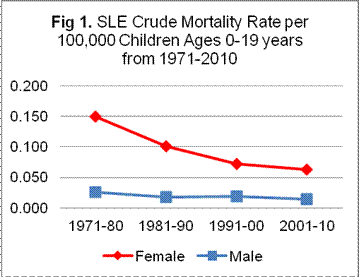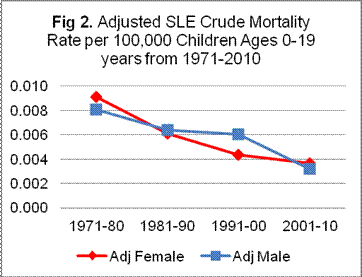Session Information
Session Type: Abstract Submissions (ACR)
Background/Purpose: To date, SLE-specific mortality studies in children and adolescents are few. Estimations of mortality in adult cohorts of SLE patients have shown that male patients often demonstrate increased mortality, suggesting worse disease severity and prognosis in males. However, these studies are limited because they estimate mortality over a finite period rather than over the lifetime of a cohort of subjects. In this study, we analyzed SLE-specific mortality data for all children and adolescents in the United States over the past 40 years and estimated the sex difference in mortality rates over their lifetime.
Methods: We studied mortality data from the National Center for Health Statistics (NCHS) from the period of 1971-2010, divided into 4 cohorts based on 10 year periods. NCHS states that over 99% of all deaths in the United States are registered. We examined death certificates for all children and adolescents ages 0-19 years old with systemic lupus erythematosus (ICD10: M32.0, ICD9: 710.0, ICD8: 734.1) listed as the underlying cause of death. Age groups, crude mortality rates per 100,000 persons (=number of deaths/population*100,000), and adjusted crude mortality rates (thus removing the effect of sex difference in SLE prevalence) were calculated. We utilized previously published data of SLE prevalence in children according to sex as the standard population for our adjusted crude mortality calculation (=crude mortality rate/prevalence of SLE per 100,000 in females and males).
Results: Of the 3,130,638,696 mortality records examined, 716, 415, 343, and 310 SLE-specific mortalities for ages 0-19 were identified during the periods of 1971-80, 1981-90, 1991-00, 2001-10 respectively. Crude mortality rate per 100,000 children has decreased over the last forty years from 1971 to 2010 (Fig 1). The absolute numbers of deaths attributed to SLE decreased from 610 (female, 85%) and 106 (male, 15%) cases during 1971-80 to 253 (female, 82%) and 57 (male, 18%) cases during 2001-10. For all years, SLE-specific deaths were significantly greater among females than males. After adjusting for the increased SLE prevalence in females, the sex difference in mortality between females and males diminished (Fig 2).
Conclusion: Mortality rates from juvenile-onset SLE appear to be declining in children and adolescents over the past 40 years. Although females still account for 82% of the total deaths due to SLE in children from 2001-2010, the overall mortality rates in males are comparable to females after correcting for increased prevalence of SLE in females.
Disclosure:
E. Y. Yen,
None;
J. M. P. Woo,
None;
D. K. McCurdy,
None.
« Back to 2013 ACR/ARHP Annual Meeting
ACR Meeting Abstracts - https://acrabstracts.org/abstract/sex-related-differences-and-trends-in-mortality-of-juvenile-onset-systemic-lupus-erythematosus-sle-in-the-united-states-over-the-last-forty-years-1971-2010/


